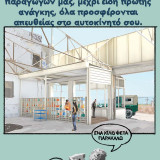This paper examines the notion of travel and its experiential dimension within the contemporary capitalist context, which often conceives of travel as a short, executive process. It focuses on the need to reclaim a deeper, more meaningful connection between the people and the road as well as the landscape they traverse, proposing a redefinition of the concept of travel as an experience.
With the Old National Road (EO1) and the ruins that lie along it as its central axis, it proposes the design of a network of Stops, which function both as points of reflection for the traveller and as tools for the reactivation of neglected settlements that have been socially, economically and culturally undermined by the philosophy of the 'new road' and diversion.
The work combines the theory of experiential travel with the need for social, cultural and economic revitalization of these areas. The ruins are exploited as material and symbolic carriers of memory, linking the subjective imagination of the traveller with the collective need for meaningful contact with the place. In this way, a network is proposed that functions simultaneously as a cultural tool, a social intervention and an architectural proposal, in order to create a new way of perceiving travel, which is not only aimed at the destination but also at the experience of the journey.







